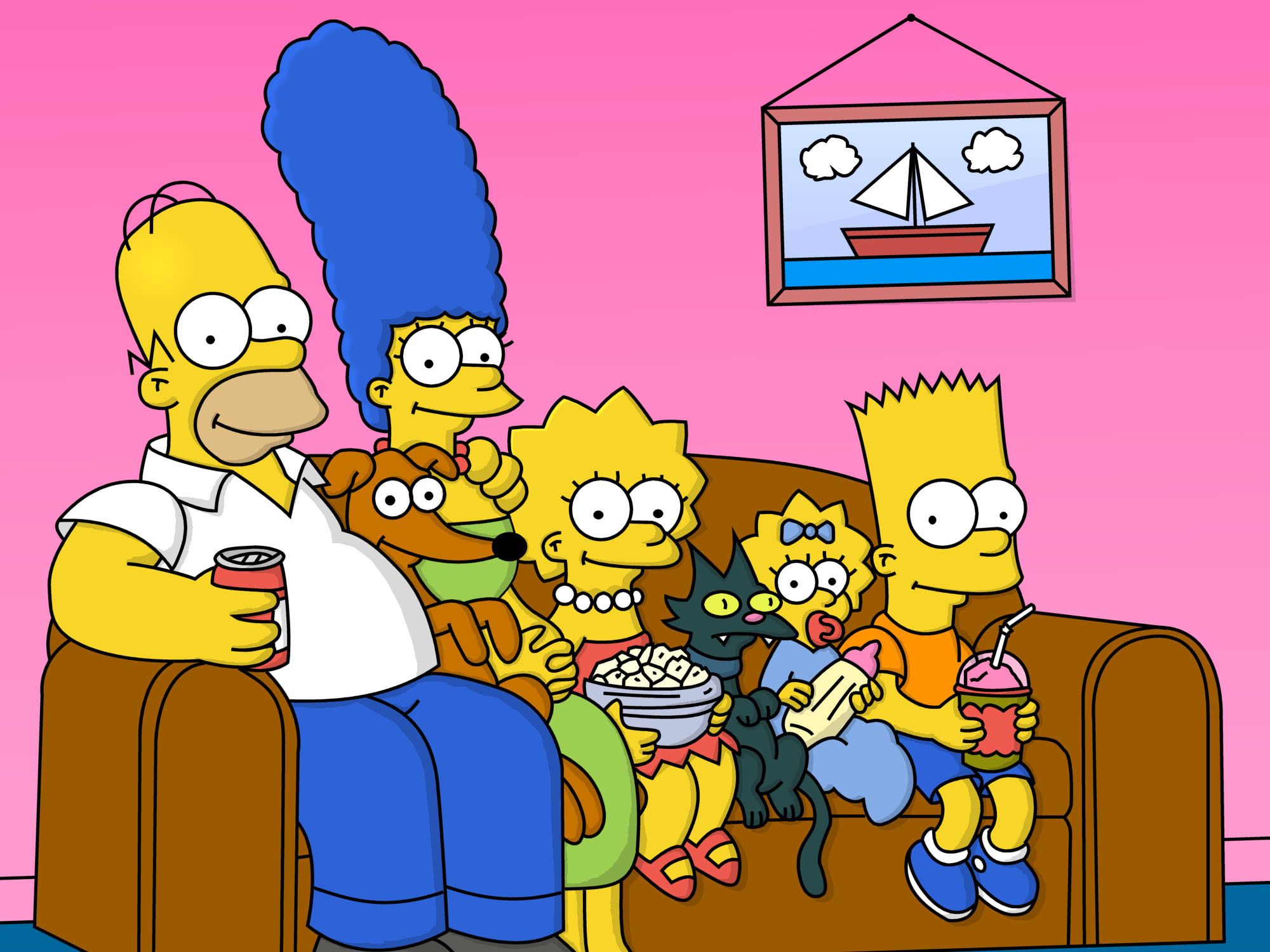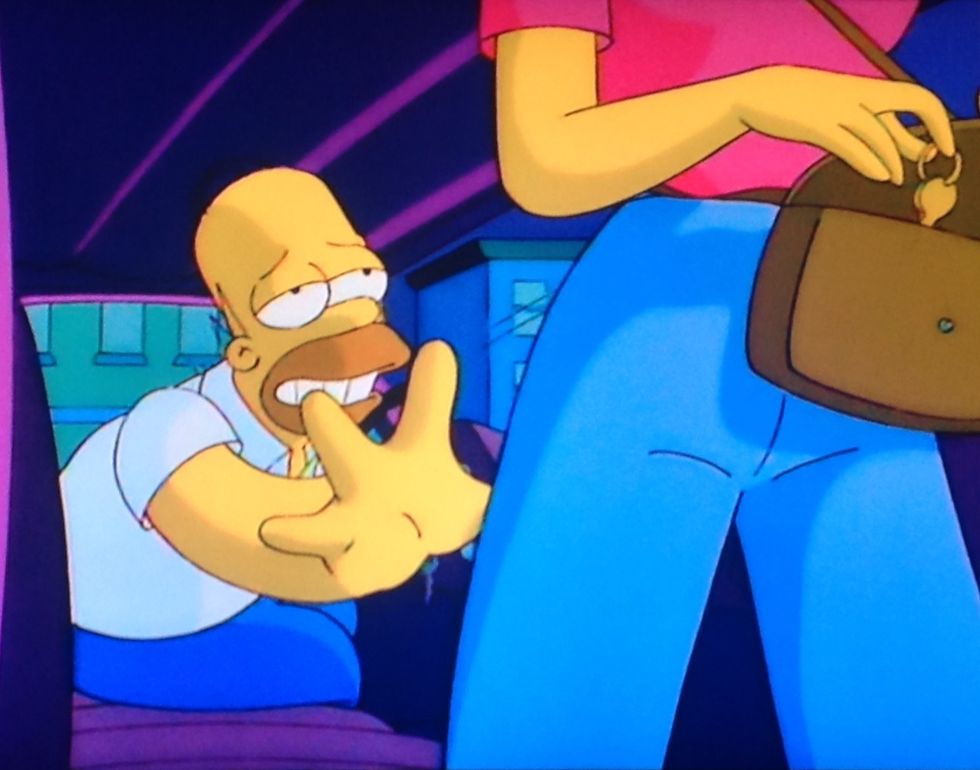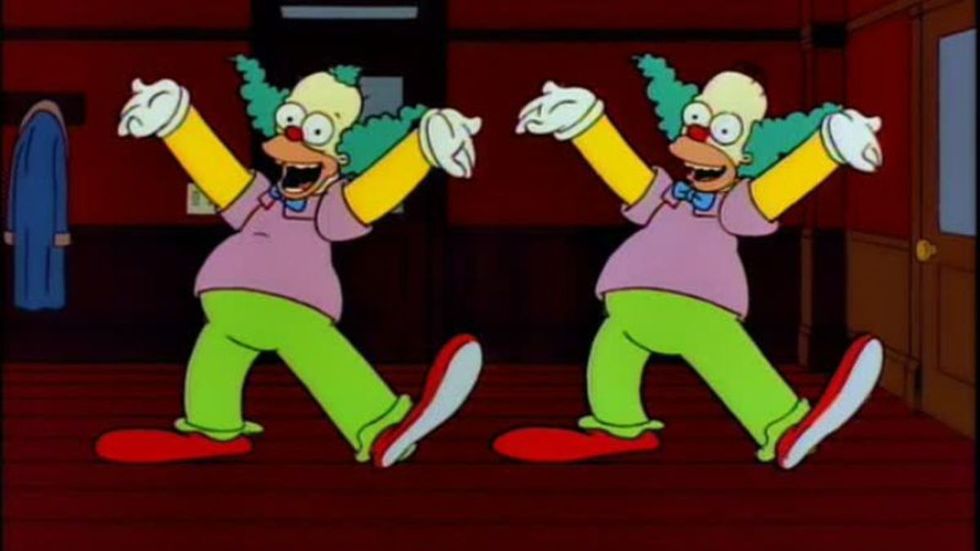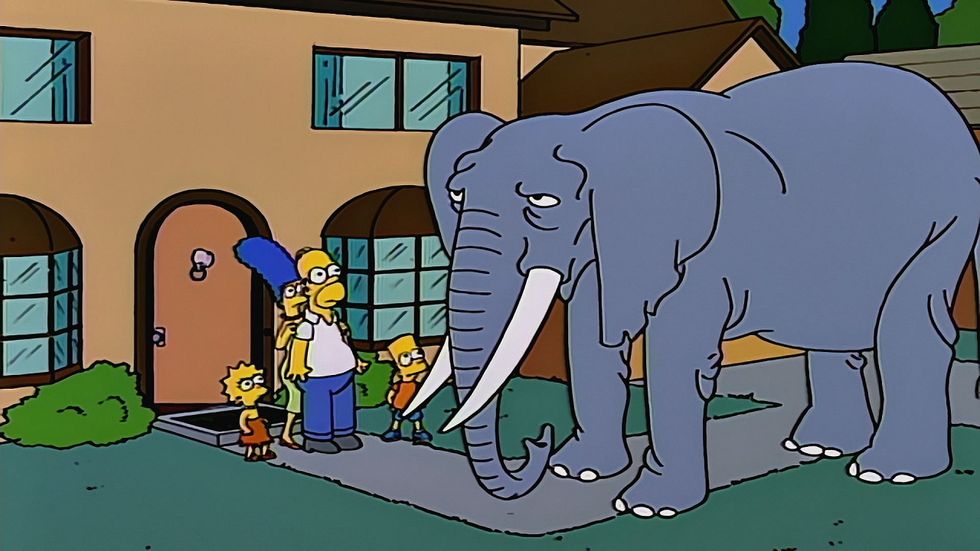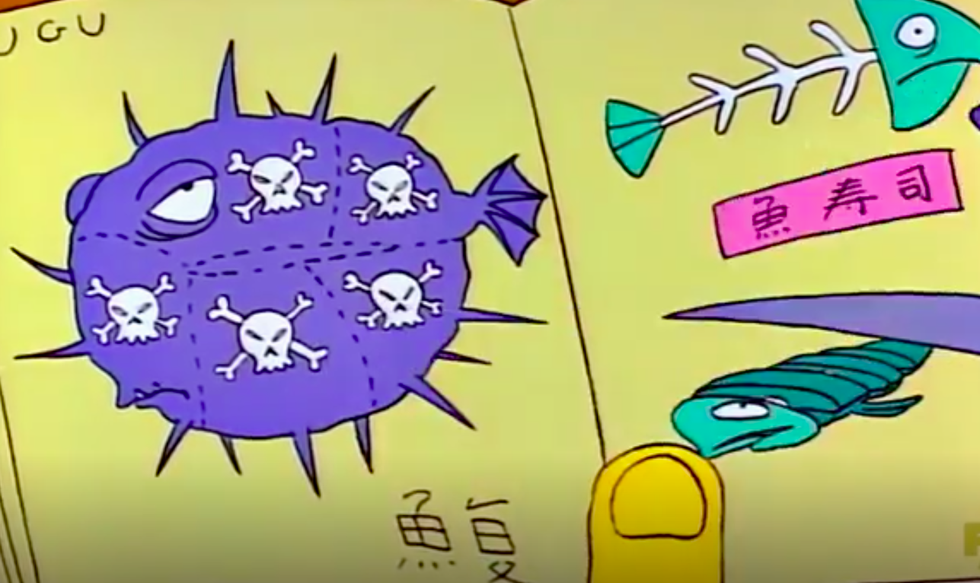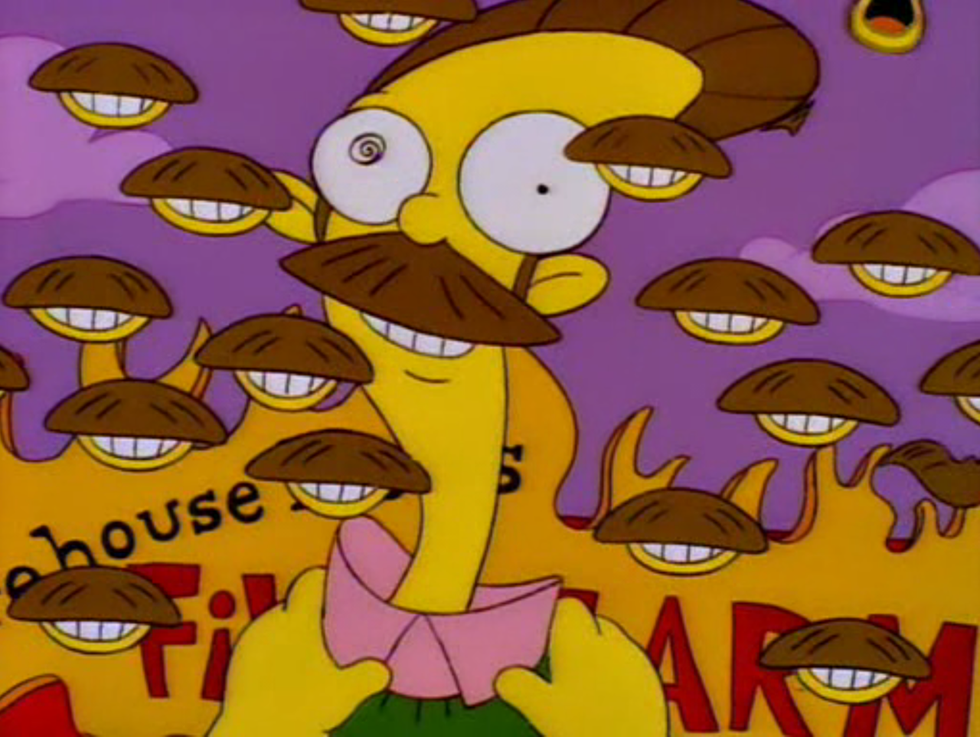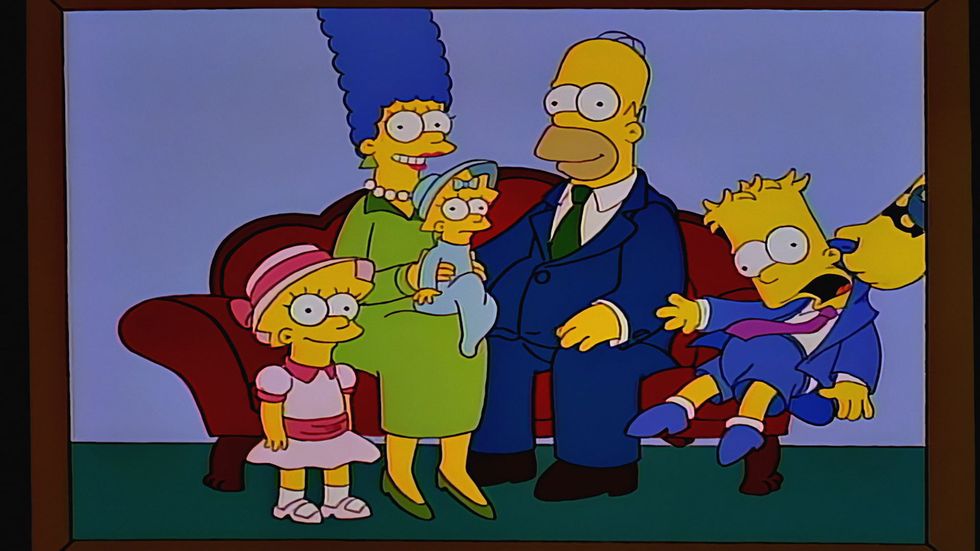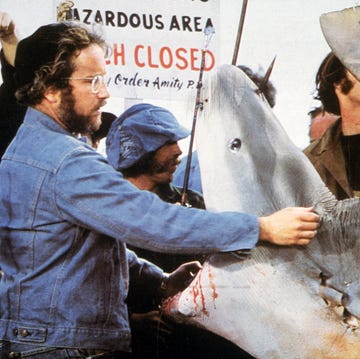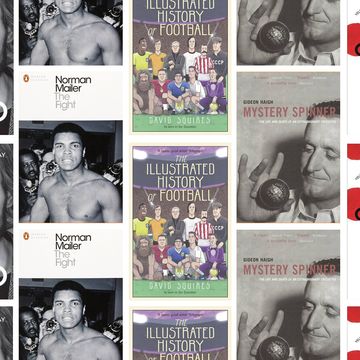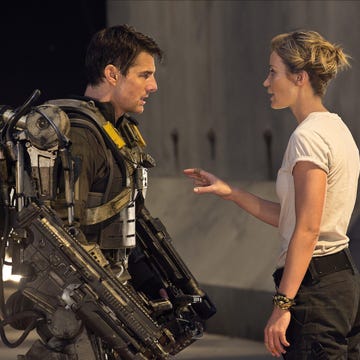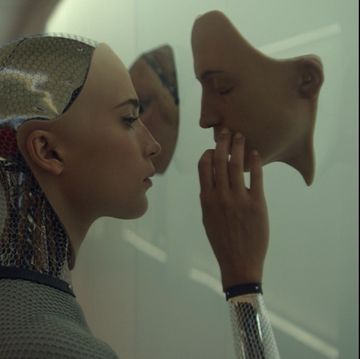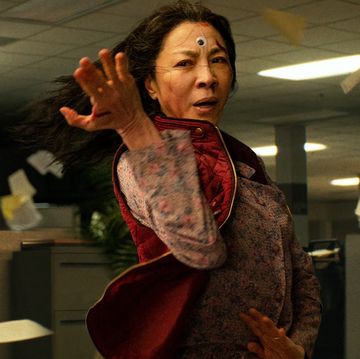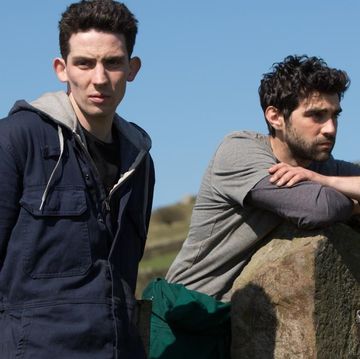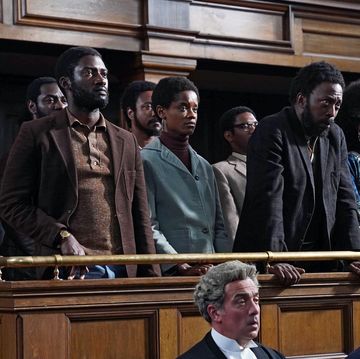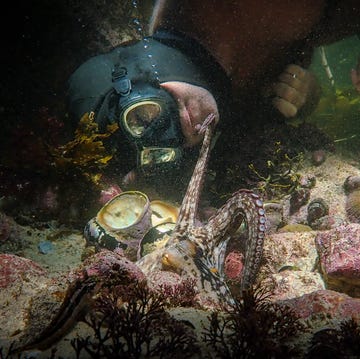For a while there it wasn't looking good. The glaring, donut-shaped hole in the Disney+ UK adverts suggested that, for one reason or another, The Simpsons wouldn't be arriving onto our streaming shores.
But thanks be to Jebus, the House of Mouse managed to force through a deal with Sky and, earlier this month, it was finally announced that the full 31 season catalogue (!!!) would be making it onto our screens by way of Disney+. To celebrate, the Esquire team decided to pull together a formal, official, sanctioned list of the best The Simpsons episodes of all-time. We do it most days, anyway.
A quick word about our methodology: there is none. This is pure gut instinct, based on subjective enjoyment, memorable gags and songs that stick in your head for decades. Eagle-eyed readers will notice that there's nothing here post-season eight. It's not that there's no decent episodes of The Simpsons after its early golden years, it's just that nothing – bar, perhaps, the weirdly post-modern 'Behind The Laughter' – shines quite as bright as that run through the Nineties.
There are also some notable missing entries. Where's 'Mr Plow?' How can we have missed 'Homer's Enemy', and perhaps the best single-episode character in television history, Frank 'Grimey' Grimes? There's no Poochie, neither of the 'Who Shot Mr Burns?' episodes. We've even passed on 'Cape Feare', perhaps the only TV show to ever combine Gilbert and Sullivan and rake-based slapstick.
But hey, we only had so much space and these ten are the ones that really spoke to us. The episodes that offer such a payload of laughter that the Esquire team returns to them time and again. That, for us, is the hallmark of a great episode of television. And if you don't agree with our picks – and we're sure that few will think we've got it 100 per cent right – feel free to tweet us your corrections. Just please, be nice about it.
Check our favourites out below, and pre-order Disney+ here. It's set to launch in the UK on 24 March, and they're offering £10 if you sign up before launch day (it'll be £59.99 a year after that, so get in there quick). At which point, more than 600 episodes will be yours, to stream at your leisure. You'd best watch these ones first, though.
Marge vs. the Monorail
(Season 4, Episode 12, 1993)
If you want to know just how much plot can be achieved in a mere 20 minutes, then the 12th episode of Season 4 is something of a masterclass, and one that also includes a legendary celebrity cameo (Leonard Nimoy) and has one-liners to spare (step forward Conan O’Brien, who wrote and produced it). Even the opening sequence is a stand-alone nugget of comedy gold: Homer clocking off from work at the nuclear power plant in a Flintstones pastiche that sets up nicely the nefarious after-hours activities of Burns and Smithers, depositing barrels of toxic waste in a public park, only to be collared by the Environmental Protection Agency and forced to pay the city a $3m fine.
But what to do with the money? This is the crux of the episode, as the citizens of Springfield discuss ideas that could be for the public good (Homer’s: “A giant billboard that says ‘no fat chicks’?”). Step forward snaky monorail salesman Lyle Lanley (the late Phil Hartman), with an expensive transportation system to pitch – via the episode’s celebrated musical number – and a plane to Tahiti to catch. It is up to Marge and a mysterious stranger (Homer: “Batman?” Marge: “No, he’s a scientist.” Homer: “Batman’s a scientist.” Marge: “IT’S NOT BATMAN.”) to save the day.
– Miranda Collinge
Homer Badman
(Season 6, Episode 9, 1994)
When a drooling Homer retrieves a piece of lost candy from the babysitter's backside while dropping her home, things quickly snowball. An angry mob form outside his door – "Two, four, six, eight, Homer's crime was very great! Great meaning large or immense, we use it in the pejorative sense!" – so he agrees to appear on a low-rent TV show called Rock Bottom to clear his name.
Bad idea.
Portrayed as a grade-A pervert, with news helicopters buzzing over head, and an even sleazier made-for-TV film of the incident called 'Portrait of an Ass-Grabber' (starring NYPD Blue's Dennis Franz in the lead role), Homer decides there is only one option left: "We're going to start a new life... Under the sea." His reputation (of sorts) is saved by Groundskeeper Willie, who comes forward with video footage to prove his innocence. For his troubles, Willie then becomes Rock Bottom's next victim. A stone cold classic from season six with so many memorable sequences and references (from Die Hard to the OJ Simpson news coverage) it feels like a best-of compilation.
– Will Hersey
Homie The Clown
(Season 6, episode 15, 1996)
Perhaps more than any other Simpsons episode, it’s difficult to talk about 'Homie the Clown' without just ending up quoting lines from it. We’ll stick to one: “I’m seein’ double here: four Krusties?” Bored at sector 7G of the power plant, Homer slowly becomes obsessed with the idea of becoming a clown – or, at least, a professional stand-in for a hard-up Krusty, who’s in deep with the mob over his gambling debts.
This one’s got such an overabundance of the most alchemical elements of The Simpsons’ hot streak – the easy mixing of under-explored peripheral characters, the physical gags around Homer’s attempts to do the tiny bike trick, the unforced absurdism of his attempts to get away from the mob by pretending he’s Benedict Arnold – that it’s hard to ignore.
– Tom Nicholson
Homer at the Bat
(Season 3, Episode 17, 1992)
Probably the episode I return to most, despite the fact that I never have and never will understand any of its turn-of-the-Nineties baseball references. I’m not alone in my love for it, either – former showrunners Sam Simon and Al Jean count it as their all-time favourite, and it’s the episode that finally pushed The Simpsons above The Cosby Show in the US ratings, way back in 1992.
But why? It is, on the face of it, just a send-up of cheesy sports movies – and it’s probably not even the funniest episode of season three (that honour belongs to ‘Radio Bart’ and its ‘Sending Our Love Down The Well’ charity anthem). But ‘Homer At The Bat’ is perhaps the most important, because it presented a shift towards absurdism that eventually set up some of the greatest episodes of later seasons.
In it, Homer’s magic bat steers the Springfield power plant softball team to the edge of victory in the league. But after Mr. Burns makes a big bet with a rival owner over the result of the championship game, he recruits nine professional baseball players to guarantee victory (all voiced by the real players) and pushes Homer out of the team. “Smithers, there’s no way I can lose this bet,” laughs Mr Burns, writing his MLB-standard team sheet. “Unless of course my nine All-Stars fall victim to nine separate misfortunes and are unable to play tomorrow! But that will never happen.”
Needless to say, Homer gets his moment in the sun, and one of the most memorable Simpsons songs to go alongside it. As an underdog story it’s heart-warming; as a Simpsons episode it's refreshingly weird, and I’ll never not crack up at Mr. Burns ordering Don Mattingly to shave off his non-existent sideburns.
– Nick Pope
Two Dozen And One Greyhounds
(Season 6, Episode 20, 1995)
The plot – a decent 101 Dalmatians parody, in which Mr Burns nicks a litter of hitherto-unwanted puppies – is irrelevant here. So, frankly, are the jokes, although there of some of season six's, not least the sight gag in which the mini-Santa's Little Helpers pop up behind Homer to steal his crisps.
No, it's all about that song, a masterpiece of zoological and sartorial puns ("Try my red robin suit, it comes one breast or two"; "Like my loafers? Former gophers. It was that or skin my chauffeurs") that has made it impossible for me to enjoy Beauty and the Beast ever again. As a pastiche that's so good it's all but ruined the original, it sits alongside Elmer Fudd's rendition of 'Ride of the Valkyries' ("Kill the wabbit! Kill the wabbit!"), arguably the zenith of an admittedly niche part of pop culture.
Of course, once the Simpson kids discover Mr Burns's plot to fashion a tuxedo from their puppies, they mount a rescue effort that culminates in a stand-off in the basement of Burns Manor. Cue a neat Spartacus nod, a melting of Burns's heart, and a killer scene-ending gag as he vows never again to kill another animal "that can do an amusing trick". Still it's all about the song. As Bart puts it, after Lisa catches him singing along: "You gotta admit, it's catchy." He's not wrong.
– Tom Banham
Bart Gets an Elephant
(Season 5, Episode 17, 1994)
A rampaging force arrives from overseas to wreak havoc, sending terrified Americans into panic. “Many of you thought it would never happen,” says the boss of a local factory, putting his staff on lockdown. “But I insisted we spend two hours every morning training for it…”
We refer to Season Five, Episode 17: ‘Bart Gets an Elephant’. (The boss is in charge of a peanut factory.) The set-up: having been confined indoors by Marge and ordered to clean the house, and after Homer starts tripping on floor polish (“Hmmm... ‘Use only in a well-ventilated area?’”), Bart and his dad tune in to a competition on local radio: ‘Give Me Something Stupid’. The prize, which Bart wins, is either $10,000 or a ‘gag prize’. Bart chooses the latter. (Homer: “Bart! With $10,000 we’d be millionaires”) It is a fully-grown African elephant.
When the radio station backtracks (“Look kid, the thing is… we don’t have an elephant”) there’s an outcry, ‘Where’s my elephant?’ goes word-of-mouth viral (newsreader Kent Brockman: “So, isn’t that what we’re all asking in our own lives? ‘Where’s my elephant?’”) and they’re forced to produce the goods. Bart’s new pet, christened Stampy, is tethered in the Simpsons’ backyard, leaving the script free to riff on animal rights, animal-human bonding and entrepreneurial hubris as Homer charges for rides. Bart sees the error of the whole enterprise and one night frees Stampy, teeing up a run of terrific gags: chaos at the peanut factory, plus rampages through first a Republican convention (banners: ‘We Want What’s Worse For Everyone’; ‘We’re Just Plain Evil’) then a Democratic convention (‘We Hate Life And Ourselves’; ’We Can’t Govern!’). Finally there’s a showdown at the Springfield Tar Pits, where Homer crashes the Simpsons’ car into a deer statue.
Homer: D’oh!
Maggie: A deer!
Marge: A female deer!
Sweetly balancing slapstick and poignancy, with added jumbo elephant carnage, this episode aired in the UK 23 years ago, where this writer taped it off the telly. Princess Diana had been killed in a car crash and Sky dedicated the day to non-stop Simpsons. When the world goes wrong, turns out there’s worse ways to spend your time.
– Johnny Davis
Homer’s Barbershop Quartet
(Season 5, Episode 1, 1993)
There’s perhaps nothing so intensely Nineties as classic Simpsons’ recurring veneration of The Beatles. This tale of Homer’s short-lived barbershop quartet, the Be Sharps, is so thickly layered with Beatles nods that you could miss most of them, and that clear love for the thing that’s being lampooned is perhaps what sets the classic era apart from the more cynical, cold seasons that followed.
George Harrison’s dry, wry appearance is perfectly pitched – getting hold of an actual Beatle, then giving him literally four lines (“Hi Homer, I’m George Harrison”; “Over there, there’s a big pile of ‘em”; “Well, what a nice fellow”; “It’s been done”) is a hell of a flex. ‘Baby On Board’ is a massive jam too.
– Tom Nicholson
One Fish, Two Fish, Blowfish, Blue Fish
(Season 2, Episode 11, 1991)
'One Fish, Two Fish, Blowfish, Bluefish', sees Lisa growing tired of her family’s weekly dinner routine and urging them to try something new: sushi. Unfortunately for Homer, he orders the only potentially poisonous fish on the menu, the 'Fugu', just as the head chef ducks out of the kitchen to hook u with Edna Krabappel in the carpark. The Junior Chef takes on the intimidating cooking responsibility and sadly fails, serving Homer toxic sushi.
Dr Hibbert gives him 24 hours to live ("Well, 22, I'm sorry I kept you waiting so long"), and Homer proceeds to make a long list of the things he wishes to achieve in that short time, starting with watching the sunrise with Marge – only to snooze his alarm in favour of a lie-in. I find this episode sadly endearing, as it highlights the typically human trapping of neglecting what we have, when we have it. Other things on Homer’s list include having a man-to-man with Bart, making peace with his dad, filming a videotape for Maggie, listening to Lisa play her sax and being intimate with Marge. Of course, these are all things he could, and should, have been doing when he was healthy and not about to die. For me, this episode emphasises the importance of love and the relationships you hold with friends and family – to live in the moment and to never become complacent with the things you have. Also, to never order Fugu.
– Dan Choppen
El Viaje Misterioso de Nuestro Jomer
(Season 8, Episode 9, 1997)
Part of the genius of The Simpsons is in its ability to mask heavy topics of the day and of adulthood in general – our prejudices, weaknesses and foibles – with light animation and brilliant writing. In 'El Viaje Misterioso de Nuestro Homer' (please allow me the hipster affectation of using the original Spanish title) the challenges of marital communication, community and Homer’s thinly veiled alcohol dependency are explored during one very spicy, and surreal, Springfield chilli festival. The titular hero, wearing special cowboy boots that are dusted off for the annual event, embarks on a viaje muy misterioso after being presented with Chief Wiggum’s brooding concoction, grown in a Guatemalan insane asylum. As Homer wretches and writhes at the heat of the glowing pepper, the town revel in his hubris. “It’s not my job to talk people out of killing themselves.” shrugs Wiggum.
Soon, faces begin to melt and blur and Homer is transported to a hallucinatory dark side of a New Mexico kind of world. “Where am I, Shelbyville?” he asks to no one as dark ochre-coloured earth appears beneath his feet and a psychedelic butterfly swoops above. A spirit guide coyote, played by Johnny Cash – his Arkansas drawl imploring Homer to “find his soulmate"– leads him through this strange new landscape.
It’s in this world, which takes up the screen for around eight minutes, where this episode becomes brilliant. Released in January 1997, the animation has aged impeccably: the shifting proportions; the mood, which is paradoxically bright and ominous; the Marge made out of sand; the ghost train rattling across the sky; the sun made out glass smashing to the ground, and the tortoise hoofed into the horizon. Artwork aside, it’s also an episode with some all-time great lines from Homer, including “Of course everything looks bad if you remember it”, and a personal existential favourite, “I'm a lonely insignificant speck on a has-been planet orbited by a cold, indifferent sun.”
– Finlay Renwick
Marge Be Not Proud
(Season 7, Episode 11, 1995)
In its early (and, let's make no mistake, best) seasons, The Simpsons steered well clear of anything that could be construed as schlock. And like other shows that wear their cynicism proudly – Seinfeld, It's Always Sunny in Philadelphia, Spaced – that made its occasional moments of genuine emotion doubly affecting.
'Marge Be Not Proud' is a great Christmas episode because, for 99 per cent of its runtime, it feels nothing like a Christmas episode. There's Christmas stuff, of course. It exists at Christmas-time. But mostly that's just scenery, the environment in which the simple plot can unfurl: Bart sees a video game, Bonestorm, advertised on TV. Unable to afford a copy, he steals it. He's caught, banned from the store, only to be forced back there for the annual family photograph, from which his security guard nemesis yanks him as the shutter drops. The photo's ruined, the family's distraught, and Homer searches for an appropriate punishment ("First, he's grounded. No leaving the house, not even for school. Second, no egg nog. In fact, no nog, period. And third, absolutely no stealing for three months").
At which point, things get even less Christmassy. Like It's A Wonderful Life, 'Marge Be Not Proud' steers into darkness to make its eventual return to the light seem twice as bright. Marge, heartbroken, pulls away from her son. Bart, mourning the loss of maternal affection, looks for a surrogate in Luann Van Houten. Snubbed on all fronts, he marches back to the Try'n'Save, and returns home with a bulge on his coat. He's collared by Marge on the stairs and, resignedly, reveals...a photo, taken to replace the one he wrecked. At which point, I weep uncontrollably, every single time. Before writing this, I couldn't rewatch the end of this episode because I know what would happen, so I read the script instead. And still I broke down. I don't know why, but it always gets me, no matter how many times I see it and even though I know exactly what's coming. And that, for me at least, is what makes 'Marge Be Not Proud' absolutely perfect.
– Tom Banham
Like this article? Sign up to our newsletter to get more delivered straight to your inbox
